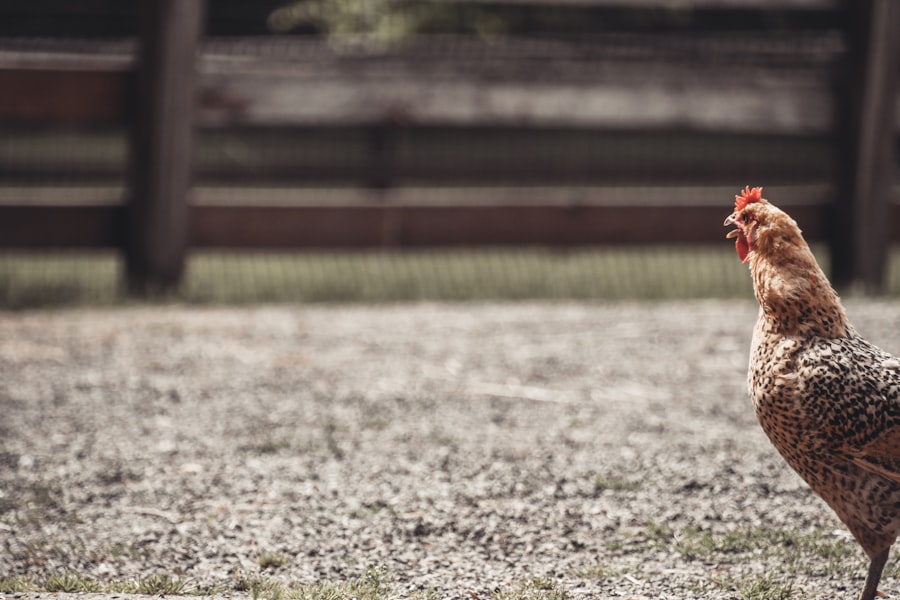Chickens are social animals with a natural instinct to communicate through vocalizations. They use various sounds to convey messages, including warnings of danger, calls for attention, and expressions of contentment. Chicken owners should understand that noise is an inherent part of their behavior and cannot be entirely eliminated.
As diurnal creatures, chickens are most active during daylight hours and generally quieter at night. Within their social structure, chickens establish and maintain a pecking order, which can lead to vocalizations as they assert dominance and communicate within the flock. This hierarchical behavior can contribute to noise levels in the coop.
While some noise is normal, excessive or prolonged vocalizations may indicate stress, discomfort, or other issues that require attention. Understanding these natural behaviors can help chicken owners better manage and minimize noise from their flock. It is essential to recognize that while some noise is inevitable, proper care and attention to the chickens’ needs can help maintain a reasonable noise level.
Table of Contents
- 1 Creating a comfortable and secure coop environment
- 2 Providing enough food and water before bedtime
- 3 Implementing a consistent routine for feeding and letting chickens out
- 4 Using natural deterrents to discourage excessive noise
- 5 Training chickens to respond to cues for quiet time
- 6 Seeking professional advice for persistent noise issues
- 7 FAQs
- 7.1 What are some reasons why chickens are noisy in the morning?
- 7.2 How can I keep my chickens quiet in the morning?
- 7.3 Are there any breeds of chickens that are quieter in the morning?
- 7.4 Is it possible to train chickens to be quiet in the morning?
- 7.5 Are there any legal restrictions on keeping noisy chickens in residential areas?
Key Takeaways
- Chickens are naturally active during the day and quiet at night, so understanding their natural behavior is key to managing noise levels.
- Creating a comfortable and secure coop environment can help reduce stress and anxiety in chickens, leading to quieter behavior.
- Providing enough food and water before bedtime can help prevent chickens from becoming restless and noisy during the night.
- Implementing a consistent routine for feeding and letting chickens out can help establish a sense of predictability and reduce excessive noise.
- Using natural deterrents, such as lavender or chamomile, can help discourage excessive noise from chickens.
Creating a comfortable and secure coop environment
Designing a Comfortable Coop
A well-designed coop should offer adequate space for the number of chickens being housed, as overcrowding can lead to stress and increased vocalizations. Additionally, the coop should be well-ventilated and provide protection from predators and the elements.
Reducing Stress and Discomfort
Ensuring that the coop is clean and free of any potential sources of discomfort, such as sharp edges or drafts, can also help reduce stress and noise levels. In addition to the physical environment, providing appropriate roosting and nesting areas can help chickens feel secure and comfortable, which can in turn reduce excessive noise.
Providing Suitable Roosting and Nesting Areas
Chickens naturally seek out elevated roosting spots to sleep, so providing suitable roosts can help them feel safe and secure at night. Nesting boxes should also be provided for hens to lay their eggs in a quiet and secluded area. By creating a comfortable and secure coop environment, chicken owners can help minimize stress and discomfort, which can contribute to excessive noise from their flock.
Providing enough food and water before bedtime

One way to minimize excessive noise from chickens is to ensure that they have access to enough food and water before bedtime. Chickens are naturally more active during the day, and providing them with a sufficient evening meal can help encourage them to settle down and rest quietly at night. Additionally, ensuring that they have access to fresh water can help keep them hydrated and content, which can also contribute to quieter behavior.
It’s important to provide a balanced diet for chickens that includes a mix of grains, protein, and essential nutrients. This can help keep them satisfied and reduce the likelihood of excessive vocalizations due to hunger or nutritional deficiencies. Additionally, providing access to food and water throughout the day can help prevent competition and aggression among the flock, which can lead to increased noise levels.
By ensuring that chickens have access to enough food and water before bedtime, owners can help promote a calm and quiet environment within the coop.
Implementing a consistent routine for feeding and letting chickens out
Establishing a consistent routine for feeding and letting chickens out can help minimize excessive noise by providing structure and predictability for the flock. Chickens thrive on routine and can become agitated or vocalize more if their daily schedule is disrupted. By feeding them at the same time each day and letting them out of the coop at a consistent time in the morning, owners can help reduce stress and promote quieter behavior.
In addition to feeding and letting chickens out at regular times, it’s important to establish a routine for collecting eggs, cleaning the coop, and providing enrichment activities. This can help keep chickens occupied and content, which can contribute to quieter behavior overall. By implementing a consistent routine, chicken owners can help reduce stress and uncertainty within the flock, which can lead to decreased noise levels.
Using natural deterrents to discourage excessive noise
For chicken owners dealing with persistent noise issues, using natural deterrents can be an effective way to discourage excessive vocalizations. One option is to provide distractions or enrichment activities within the coop to keep chickens occupied and engaged. This can include hanging treats or toys for them to peck at, providing perches or platforms for them to explore, or introducing new elements into their environment to stimulate their curiosity.
Another natural deterrent for excessive noise is to provide ample space for chickens to roam and forage. Allowing them access to a larger outdoor area or rotating their grazing space can help prevent boredom and reduce the likelihood of excessive vocalizations. Additionally, providing natural barriers such as shrubs or trees within their outdoor area can help create visual barriers and reduce the likelihood of alarm calls or territorial disputes with neighboring wildlife.
Training chickens to respond to cues for quiet time

Positive Reinforcement Techniques
Training chickens to respond to cues for quiet time can be an effective way to manage excessive noise within the flock. By using positive reinforcement techniques, such as rewarding calm behavior with treats or praise, owners can encourage chickens to settle down and remain quiet during specific times of day or in response to certain cues.
Establishing a Quiet Time Routine
One approach is to use a specific sound or signal, such as a gentle clucking noise or a hand gesture, to indicate that it’s time for quiet. By consistently using this cue before bedtime or during designated quiet hours, chickens can learn to associate the signal with the expectation of calm behavior.
Benefits of Quiet Time Training
This training can be particularly useful for managing noise levels during evening hours when neighbors may be more sensitive to disturbances. Over time, this training can help establish a routine for quiet time within the flock and reduce excessive noise levels.
Seeking professional advice for persistent noise issues
For chicken owners dealing with persistent noise issues despite their best efforts, seeking professional advice from a veterinarian or animal behaviorist may be necessary. A professional can help assess the underlying causes of excessive vocalizations within the flock and provide guidance on how to address them effectively. They may also be able to offer specific strategies for managing noise levels based on the individual needs and behaviors of the chickens in question.
In some cases, persistent noise issues may be indicative of underlying health problems or environmental stressors that require professional intervention. A veterinarian can conduct a thorough examination of the flock to rule out any medical issues that may be contributing to excessive vocalizations. An animal behaviorist can also provide valuable insights into the social dynamics within the flock and offer tailored recommendations for managing noise levels based on their expertise in chicken behavior.
In conclusion, understanding the natural behavior of chickens is essential for managing excessive noise within a flock. By creating a comfortable and secure coop environment, providing enough food and water before bedtime, implementing a consistent routine for feeding and letting chickens out, using natural deterrents to discourage excessive noise, training chickens to respond to cues for quiet time, and seeking professional advice for persistent noise issues, chicken owners can effectively minimize noise levels within their flock while promoting their overall well-being.
If you’re looking for ways to keep your chickens quiet in the morning, you may also be interested in learning about how to convert a shed into a chicken coop. This article from Poultry Wizard provides helpful tips and guidance on transforming an existing structure into a suitable home for your feathered friends. By creating a comfortable and spacious living space for your chickens, you may be able to minimize noise disturbances in the early hours.
FAQs
What are some reasons why chickens are noisy in the morning?
Chickens are naturally noisy in the morning because they are signaling the start of the day, communicating with other chickens, or expressing excitement about finding food.
How can I keep my chickens quiet in the morning?
To keep your chickens quiet in the morning, you can ensure they have enough food and water before bedtime, provide a comfortable and dark coop for them to sleep in, and consider using earplugs or soundproofing the coop.
Are there any breeds of chickens that are quieter in the morning?
Some breeds of chickens are known to be quieter than others, such as Silkies, Cochins, and Orpingtons. These breeds tend to be more docile and less vocal in the morning.
Is it possible to train chickens to be quiet in the morning?
While it may be difficult to completely train chickens to be quiet in the morning, you can establish a routine for feeding and provide positive reinforcement for quiet behavior to help reduce their morning noise.
Are there any legal restrictions on keeping noisy chickens in residential areas?
Many residential areas have local ordinances or regulations regarding noise levels, including those related to keeping chickens. It’s important to check with your local government to understand any restrictions or guidelines for keeping chickens in your area.
Meet Walter, the feathered-friend fanatic of Florida! Nestled in the sunshine state, Walter struts through life with his feathered companions, clucking his way to happiness. With a coop that’s fancier than a five-star hotel, he’s the Don Juan of the chicken world. When he’s not teaching his hens to do the cha-cha, you’ll find him in a heated debate with his prized rooster, Sir Clucks-a-Lot. Walter’s poultry passion is no yolk; he’s the sunny-side-up guy you never knew you needed in your flock of friends!







